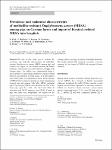Prevalence and molecular characteristics of methicillin-resistant Staphylococcus aureus (MRSA) among pigs on German farms and import of livestock-related MRSA into hospitals
Köck, Robin
Harlizius, J.
Bressan, N.
Laerberg, R.
Wieler, Lothar H.
Witte, Wolfgang
Deurenberg, R. H.
Voss, A.
Becker, Karsten
Friedrich, Alexander W.
The aim of this study was to evaluate the prevalence and molecular characteristics of methicillin-resistant Staphylococcus aureus (MRSA) among pigs and estimate the impact of this animal reservoir on human healthcare. Nasal swabs were derived from 1,600 pigs at 40 German farms. The MRSA were characterized using S. aureus protein A (spa) typing, multilocus sequence typing (MLST) and detection of toxin genes. In a retrospective case control study, we compared risk factors for the carriage of MRSA between patients carrying spa types found among regional pigs and patients with other MRSA molecular types. Pigs carrying MRSA were identified on 70% of the farms (spa types t011, t034, t108, t1451 and t2510, all associated with MLST sequence type ST398). Contact to pigs and cattle were independent risk factors for the carriage of these spa types in patients at hospital admission. Our results indicate that livestock represents a relevant reservoir for the import of MRSA into regional German hospitals.
No license information
Related Items
Show related Items with similar Title, Author, Creator or Subject.
-
2010-10-14ZeitschriftenartikelMethicillin-resistant Staphylococcus aureus (MRSA): burden of disease and control challenges in Europe Köck, Robin; Becker, Karsten; Cookson, B.; Gemert-Pijnen, J. E. van; Harbarth, S.; Kluytmans, J.; Mielke, Martin; Peters, G.; Skov, R. L.; Struelens, M. J.; Tacconelli, E.; Torné, A. Navarro; Witte, Wolfgang; Friedrich, Alexander W.Methicillin-resistant Staphylococcus aureus (MRSA) is a major cause of healthcare- and community-associated infections worldwide. Within the healthcare setting alone, MRSA infections are estimated to affect more than 150,000 ...
-
2009-07-01ZeitschriftenartikelEmergence of a community-associated methicillin-resistant Staphylococcus aureus with unique resistance profile in Southwest of Nigeria Ghebremedhin, B.; Olugbosi, M. O.; Raji, A. M.; Layer, Franziska; Bakare, R. A.; König, B.; König, WolfgangPheno-, genotypic and toxin gene analysis has not been done yet all in one for Nigerian Staphylococcus aureus population. This study provides a comprehensive overview on the molecular epidemiology and genetic diversity of ...
-
2014-04-10ZeitschriftenartikelResults of surveillance for infections with Shiga toxinproducing Escherichia coli (STEC) of serotype O104:H4 after the large outbreak in Germany, July to December 2011 Frank, Christina; Milde-Busch, Astrid; Werber, DirkAfter the massive outbreak of infections with Shiga toxin-producing Escherichia coli (STEC) of serotype O104:H4 in Germany in the summer of 2011, post-outbreak surveillance for further infections with this type of STEC was ...

